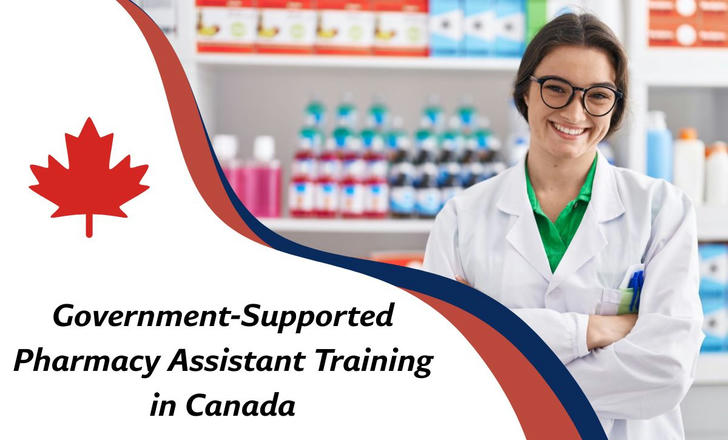💊 How to Become a Pharmacy Assistant in Canada: Government-supported Training Paths for Entry-Level
Looking to enter healthcare quickly? Government-supported pharmacy assistant programs in Canada offer short-term training, no prior experience needed, and job-ready certification—ideal for starting a stable, in-demand career.

📚 Why These Training Programs Are Gaining Attention
Many pharmacy assistant training programs in Canada now offer:
✅ No prior experience required
✅ Short-term completion
✅ Government-supported tuition assistance
✅ Recognized certificates (aligned with provincial health standards)
✅ Pathways to employment or externships
Some institutions also offer earn-as-you-learn models through partnerships with employers. These may involve receiving financial sponsorship or stipends during the training period, but can include minimum service terms or reimbursement clauses if the participant exits the program early.
👥 Who Is This Training Best Suited For?
Pharmacy assistant training programs in Canada are designed to be inclusive and accessible, making them ideal for:
💡 Recent high school graduates seeking a fast entry into healthcare without needing a university degree
💡 Career changers looking to move into a stable, in-demand field with short-term retraining
💡 Immigrants or newcomers who want recognized certifications to support local employment
💡 Adults re-entering the workforce after a gap, including parents or caregivers seeking flexible hours
💡 Individuals without prior healthcare experience, but with strong attention to detail and communication skills
💡 Budget-conscious learners interested in tuition-assisted or earn-as-you-learn options
These programs are especially helpful for those who want a clear, structured path into the healthcare sector, with a focus on community-based or pharmacy retail roles.
📊 Government-Supported Pharmacy Assistant Programs in Canada (2025)
| Program Name | Institution | Location | Support Type | Key Feature |
|---|---|---|---|---|
| Community Pharmacy Assistant Certificate | Conestoga College | Kitchener, Ontario | Eligible for OSAP and internal scholarships | Includes lab training and placement focused on community pharmacy operations |
| Community Pharmacy Assistant Program | Fanshawe College | London, Ontario | OSAP-supported career program | Combines hands-on lab training with real-world work experience |
| Online Pharmacy Assistant Certificate | George Brown College | Toronto (Online Delivery) | Financial aid and workforce programs available | Certificate program designed for remote learning with job readiness support |
| Pharmacy Assistant Program | SAIT | Alberta | Eligible for Canada Alberta Job Grant | Top graduate employment rate, SAIT Pharmacy Assistant certificate upon completion, combining theory and practice |
💡 Programs offering financial sponsorship or workplace stipends may include a minimum work commitment or early withdrawal repayment clause.
💰 Financial Support and Government Involvement
Many provinces support skills development in healthcare through programs funded or coordinated by provincial labor or training departments. These supports may include:
• Tuition offsets or training grants
• Tools and materials allowances
• Earn-as-you-learn incentives (through employer involvement)
• Transportation or childcare assistance for eligible participants
Institutions that receive support are typically listed on official workforce development websites or regional training databases. Not all programs are guaranteed funding every year; availability may vary by province and applicant eligibility.
📈 Job Outlook and Salary Expectations
According to Job Bank Canada:
• Entry-level pharmacy assistants earn around CA$18/hour
• Mid-level roles typically offer CA$20–22/hour, depending on province and setting
• Some hospital or unionized roles may pay up to CA$24/hour
Demand is projected to remain stable through 2025 and beyond, particularly in urban centers and growing suburban areas.
📝 Frequently Asked Questions
Is previous healthcare experience needed to apply?
No. Most training programs are designed for individuals starting a new career path.
How long is the training?
Program lengths vary, but most last between 5 and 7 months.
Are these certifications recognized?
Yes. Programs offered through accredited colleges or employer-endorsed training are generally recognized across Canada.
Can training be combined with work?
Yes. Many hybrid and earn-as-you-learn models support part-time or scheduled work-learning balance.
Are there conditions for sponsored programs?
Programs offering financial sponsorship or stipends may include a service period agreement or early exit repayment clause.
